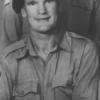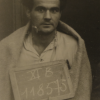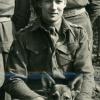“After a fortnight we were taken for interrogation by a Luftwaffe pilot with a couple of Iron Crosses. I said ‘what are you doing in this job?’ He said ‘well once you lose your aircraft, with the state we are in you have got to find yourself another job. I speak English so this is what I am doing” .The interrogation lasted about an hour and it was friendly enough. He asked me two strange questions – what Boy Browning looked like and what ‘Recce’ meant on the shoulder flash. Well, I thought the answer to the last question was a bit obvious really. But on both occasions I just repeated my name, rank and number. Then interestingly enough, he went to a file index and threw down a card with my name on it – 1st Lieutenant Timothy – which obviously dealt with the Bruneval raid. He said ‘What about this?’ I repeated name, rank and number, and he just crossed out ‘1st Lieutenant’ and wrote ‘Major’ and that was that.”
John went on to speak about his time in captivity:
“For the most part as prisoners of war food was very short and we were always hungry; the German food was pretty meagre and consisted mainly of beet and potatoes. I think we got a meat ration once a week. This was understandable given the way the war was going for the Germans and the fact that we were low down in the pecking order. At first we were moved around quite a bit, mostly Arnhem people. We never seemed to get the Red Cross parcels because we were in a mobile set up. After about 3 months by January, I think, we arrived at a permanent Oflag – Eichstatt VIIB.
We stayed in the bag until March. We tried the odd escape from the huts but had never got away. We knew the Russians were closing in and the camp was put on notice to march. By now we were getting Red Cross parcels and there was a stack of tobacco available. I made a rucksack out of a Red Cross kit bag and some braces I had. Then a train came in with some more Red Cross parcels. Quite remarkable really, given the state of the war, that parcels arrived at all. There was enough for two parcels a man. So I put tins of food in my rucksack and ate up as much as I could. On the march we split up into sticks of six there were 2 cooks, 2 to sort out the drinks and 2 washers up. I was one of the washers up!”
“On the march we discussed making an escape. We didn’t consider it daring to escape since we were being guarded by Dad’s Army types. Prior to the escape we paired off and I joined up with Ronnie Stark – another company commander from the 1st Battalion. On the third day of the march we reached Rottenegg and at about 19.00 hours we made our way past the German guards to a nearby wood. We hid there until about 22.00 hours and then moved across country to our own lines. We moved most of the first night and then hid for three days in a wood a few miles south of the Danube hoping that our own troops would soon breakthrough. We had very little food so decided after the three days to move nearer the Danube. While on the move we contacted a French worker who gave us food and later took us to the home of the German who employed him. He was most helpful and took a considerable risk because SS troops were in the vicinity of the house. Here we were given shelter and the next day the German took us to his lodge in a wood on the outskirts of the village. We stayed in the lodge for two days and then moved because German and Hungarian troops were taking up positions in the wood. After this we joined up with a French commando in Au, where we stayed for three days. Whilst there we were able to gain a certain amount of information as the farm we were using was occupied by German and Hungarian troops. This information we passed onto the American commander of the relieving spearhead. We went on one patrol with them. They were new troops and there was a bit of shooting but nothing serious. After being relieved we made our way back to Nürnberg.”
Shortly after, John was evacuated back to England via Brussels.
Reproduced for ParaData by kind permission of Harvey Grenville
Source:
Harvey Grenville
Read More




Latest Comments
There are currently no comments for this content.
Add Comment
In order to add comments you must be registered with ParaData.
If you are currently a ParaData member please login.
If you are not currently a ParaData member but wish to get involved please register.